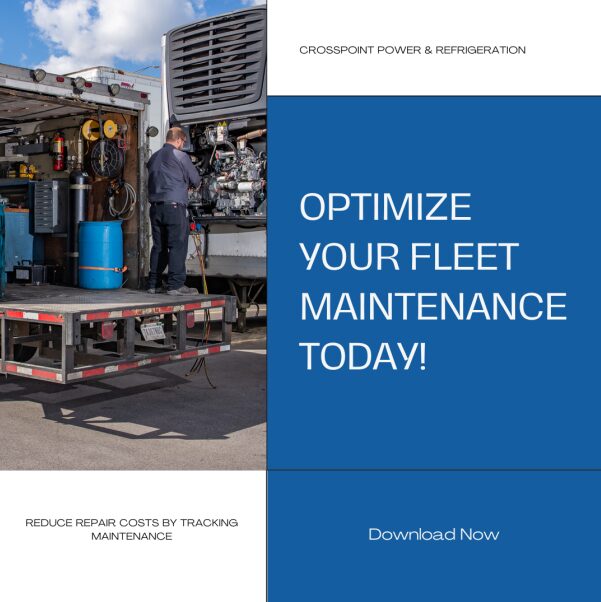Whether you’re hauling fresh produce across the state or delivering frozen pharmaceuticals cross-country, one thing is non-negotiable: your transport refrigeration unit (TRU) needs to be in top condition. A failed reefer unit can lead to spoiled cargo, unhappy customers, and major financial losses—not to mention the potential for regulatory violations.
That’s why preventative maintenance is crucial. Regular checkups not only help you avoid unexpected breakdowns but also extend the life of your unit and keep your operation compliant and efficient.
Comprehensive Preventive Maintenance Checklist for Transport Refrigeration Units
Use this comprehensive preventative maintenance checklist to keep your TRU road-ready year-round.
1. Engine and Mechanical System Checks
The heart of your reefer unit is its engine. Keep it healthy with these routine inspections:
- Oil and Filters: Check oil level and condition. Replace oil and filters at manufacturer-recommended intervals.
- Coolant System: Inspect coolant level and protection rating. Examine radiator cap and hoses for signs of wear or leaks.
- Fuel System: Look for leaks, clogged filters, or water contamination in the tank. Ensure proper fuel flow.
- Air Filter: Clean or replace the air filter to maintain airflow and fuel efficiency.
- Belts and Hoses: Inspect for cracks, fraying, and proper tension.
- Battery and Terminals: Check charge level, clean terminals, and inspect for corrosion or loose cables.
- Exhaust System: Look for signs of rust, holes, or other damage that could lead to dangerous fumes or inefficiencies.
- Drive Coupler & Compressor: Inspect for any unusual wear or fluid leaks.
2. Refrigeration System Components
Temperature-sensitive cargo depends on a well-functioning refrigeration loop. Don’t skip these critical checks:
- Refrigerant Level: Confirm levels are within range. Low refrigerant can be a sign of a leak or system inefficiency.
- Evaporator and Condenser Coils: Clean coils regularly to avoid overheating or reduced cooling capacity.
- Fans and Motors: Make sure both condenser and evaporator fans are spinning freely and delivering proper airflow.
- Drain Hoses and Valves: Clear any blockages that could lead to water buildup and icing.
- Refrigerant Lines and Connections: Look for cracks, leaks, or pressure inconsistencies.
- Compressor Performance: Listen for odd noises, check pressure readings, and verify proper cycling.
3. Trailer Body and Interior Condition
Even the best refrigeration system can’t maintain temperature if your trailer isn’t sealed tight or clean inside.
- Doors and Seals: Check for gaps, damage, or warping. Replace gaskets or adjust hinges as needed to ensure a tight seal.
- Interior Panels: Look for tears, punctures, or insulation issues that could affect temperature control.
- Floor Channels and Bulkheads: Remove debris and check for proper airflow.
- Air Chutes and Ducts: Ensure clear pathways to promote even air distribution throughout the cargo space.
- Drainage System: Ensure trailer drains are not clogged to avoid standing water or ice buildup.
- Temperature Settings: Verify settings match your cargo requirements.
4. Software, Electrical, and Safety Checks
Today’s TRUs are more high-tech than ever. Don’t overlook digital maintenance:
- Software Updates: Check for and install the latest firmware for your unit’s control system.
- Electrical Connections: Inspect for frayed wires, loose terminals, or burned connectors.
- Vibration and Noise: Excess vibration can signal imbalances or failing components—especially around fan blades or mounts.
- Moisture Intrusion: Look for signs of water inside electrical panels or behind wall panels.
5. Scheduled Maintenance Essentials
Create a regular service calendar based on usage and manufacturer recommendations:
- TRU Pre-Trip: Running a system pre-trip every day is the easiest way to make sure your refrigeration unit is operating correctly.
- Defrost Cycles: Ensure the system performs routine defrosting and is not icing up.
- Cleaning Routines: Regularly clean the unit—especially coils and drain lines—to prevent efficiency losses.
- Filter Replacements: Stick to a regular schedule for oil, air, and fuel filters. Dirty filters make your system work harder and wear out faster.
Why Preventative Maintenance for Transport Refrigeration Matters
A properly maintained transport refrigeration unit keeps your cargo safe, your business running, and your reputation intact. Routine maintenance might seem like an added chore, but it saves time and money in the long run by preventing costly breakdowns and emergency service calls.
Set a calendar reminder. Make it part of your pre-trip inspection. Better yet, partner with a service provider who understands reefer units inside and out.
Need help building a maintenance routine or scheduling inspections?
Whether you need routine preventative care, emergency repairs, or a full system overhaul, our expert technicians at Crosspoint Power & Refrigeration are here to help. We offer comprehensive in-shop maintenance and repair services for all makes and models of transport refrigeration units. Can’t make it to us? No problem—our mobile service teams cover all of Indiana, bringing professional diagnostics and repairs straight to your location.
Keep your reefer fleet reliable, compliant, and cargo-ready—contact us today to schedule service or set up a custom maintenance plan that works for your routes and deadlines.

